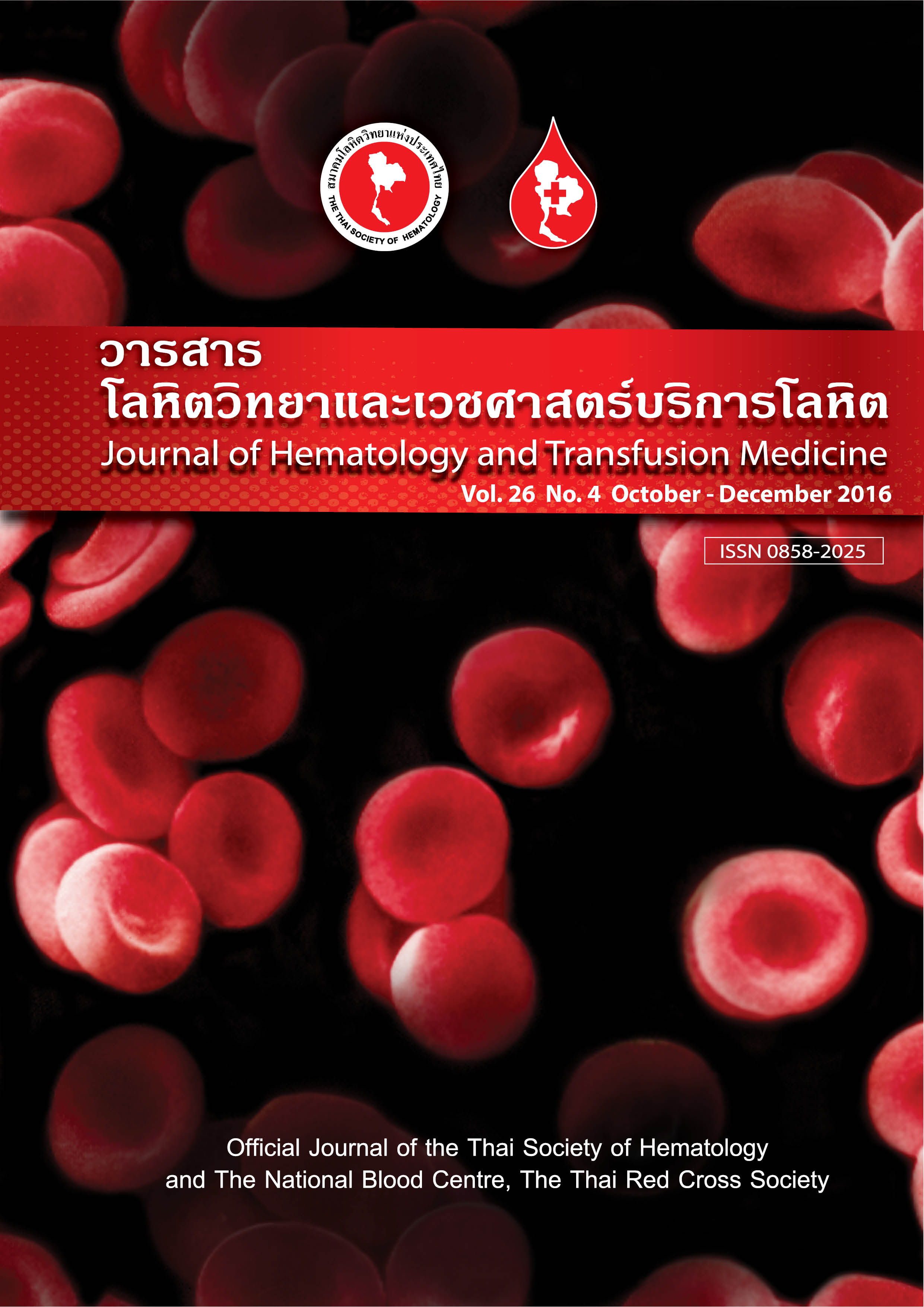ความชุกของแอนติบอดีต่อหมู่โลหิตในกลุ่มผู้ป่วยรับโลหิตและหญิงตั้งครรภ์โรงพยาบาลตากสิน
Keywords:
Unexpected antibodies, Transfused patients, Pregnant womenAbstract
บทคัดย่อ
การศึกษาในครั้งนี้มีวัตถุประสงค์ในการหาความชุกของแอนติบอดีต่อแอนติเจนของเม็ดโลหิตแดงในกลุ่มผู้ป่วยรับโลหิตและหญิงตั้งครรภ์ ด้วยการใช้เทคนิค microcolumn agglutination test ร่วมกับการใช้ tube test โดยการเก็บข้อมูลย้อนหลังเป็นระยะเวลา 3 ปี ระหว่างปี พ.ศ. 2555-2557 ศึกษาเปรียบเทียบลักษณะการกระจายของแอนติบอดีแต่ละชนิดที่ตรวจพบ ในผู้ป่วยที่ได้รับการรักษาด้วยการให้โลหิตหรือส่วนประกอบโลหิต จำนวนรวม 15,297 ราย เป็นผู้ป่วยชาย 5,233 ราย (34.21%) เป็นผู้ป่วยหญิง 10,064 ราย (65.79%) และหญิงตั้งครรภ์ 12,445 ราย โดยไม่ซ้ำรายบุคคล ผลการตรวจกรองและการตรวจยืนยันชนิดแอนติบอดีในแต่ละกลุ่มพบว่า ผู้ป่วยชายมีแอนติบอดีต่อหมู่เลือด 142 ราย (2.71%) ได้แก่ หมู่เลือดระบบ Rh 22 ราย MNS 53 ราย P1PK 16 ราย Lewis 14 ราย Kidd 1 ราย Duffy 2 ราย multiple antibodies 26 ราย และ unidentified antibodies 8 รายผู้ป่วยหญิงมีแอนติบอดีต่อหมู่เลือด 259 ราย (2.59%) ได้แก่ หมู่เลือดระบบ Rh 46 ราย MNS 101 ราย P1PK 23 ราย Lewis 22 ราย Kidd 1 ราย multiple antibodies 50 ราย และ unidentified antibodies 16 ราย หญิงตั้งครรภ์มีแอนติบอดีต่อหมู่เลือด 285 ราย (2.29%) ได้แก่หมู่เลือดระบบ Rh 13 ราย MNS 53 ราย P1PK 93 ราย Lewis 76 ราย multiple antibodies 26 ราย และ unidentified antibodies 26 ราย ผลการศึกษาพบว่า ความชุกของแอนติบอดีในกลุ่มผู้ป่วยรับโลหิตและหญิงตั้งครรภ์ไม่แตกต่างกันอย่างมีนัยสำคัญทางสถิติ (p = 0.078) ทั้งนี้ลักษณะความชุกของแอนติบอดีที่ตรวจพบสามารถแตกต่างกันได้ ขึ้นกับวิธีที่ใช้ในการตรวจวิเคราะห์ และกลุ่มตัวอย่างที่ทำการศึกษา ดังนั้นการตรวจติดตามและการตรวจยืนยันแอนติบอดีของหมู่เลือดในกลุ่มผู้ป่วยและหญิงตั้งครรภ์สามารถพบได้มากกว่าคนปกติเพื่อบันทึกประวัติ ถือว่ามีความสำคัญและเป็นมาตรฐานในการตรวจวิเคราะห์ทางธนาคารเลือดเพื่อความปลอดภัยในการรับโลหิตต่อไป
Abstract:
This study aimed to determine and identify the prevalence of unexpected antibody in transfusedpatients and pregnant women who attended antenatal clinic at Taksin Hospital. The retrospective (2012-2014) data were analysed for the prevalence of allo-imunization in each group. A combination of microcolumn agglutination and tube test was applied to the antibody identification on 15,297 samples of transfused patients and 12,445 pregnant women. Among the total transfused patients in this study, they were 5,233 males (34.21%), 10,064 females (65.79%) and 12,445 cases of pregnant women. The antibody screening results appeared that 142 transfused male patients (2.71%) were positive and identified as 22 Rh, 53 MNS, 16 P1PK, 14 Lewis, 1 Kidd, 2 Duffy, 26 multiple antibodies and 8 unidentified antibodies, 259 transfused female patients (2.59%) were positive and identified as 46 Rh, 101 MNS, 23 P1PK, 22 Lewis, 1 Kidd, 50 multiple antibodies and 16 unidentifiedantibodies. The antibody screening results of pregnant women were positive for 285 cases (2.29%) and identified as 13 Rh, 53 MNS, 93 P1PK, 76 Lewis, 24 multiple antibodies and 26 unidentified antibodies. Our results revealed that the prevalence of unexpected antibodies, found in transfused patients and pregnant women, were notsignificantly difference (p = 0.078). Thus, the prevalence of unexpected antibodies in each study may found to be different due to the group of study including laboratory testing techniques. However, the group of transfused patients and pregnant women may found to have unexpected antibodies higher than normal people. The result of this study may provoke the awareness and concern the presence of unexpected antibodies in transfused patients and pregnant women in order to provide better care or treatment at Taksin Hospital.



